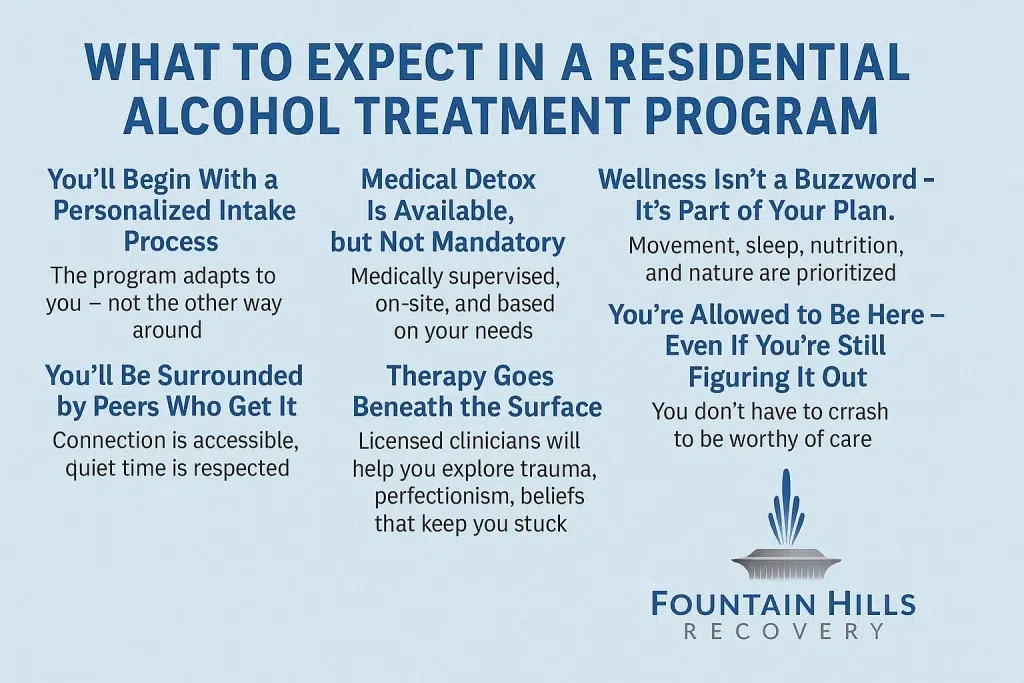When you’re not in crisis—but not at peace either—it’s easy to talk yourself out of seeking help. You tell yourself it’s “not that bad.” That everyone drinks like this. That maybe cutting back on your own is enough.
And maybe it is. But maybe, deep down, something’s whispering: What if I just need some space to figure things out?
That’s where a residential treatment program can come in—not as a last resort, but as an intentional pause. A reset. A decision to prioritize clarity and healing, even before everything breaks.
If you’ve ever wondered what inpatient care actually looks like—and whether it’s too much for someone like you—this is your gentle, clear guide.
You’ll Begin With a Personalized Intake Process
Every person’s relationship with substances is different. So when you arrive at a residential treatment program, the first thing that happens isn’t restriction—it’s conversation.
You’ll meet with a team that includes a physician, a therapist, and often a case manager. Together, they’ll get a full picture of your physical health, mental health, substance use patterns, emotional stressors, and lifestyle goals.
No judgment. No assumptions. Just real curiosity about who you are and what you need.
Your intake process will help shape everything from your daily schedule to your therapy format. If you’ve never been in treatment before, this is where the program adapts to you—not the other way around.
Medical Detox Is Available, but Not Mandatory
Some people need to detox before beginning full participation in therapy. Others don’t. If you do, the process is medically supervised, discreet, and designed for comfort. At Fountain Hills Recovery, detox services happen onsite, so you don’t need to be transferred between facilities.
Medical staff will monitor vitals, manage withdrawal symptoms, and offer emotional support throughout. Most detox periods last 3–7 days, depending on the substance and personal health factors.
If you’re stable and don’t require detox, you’ll move directly into your tailored treatment plan.
Daily Life in Residential Care Is Structured, Not Rigid
Think of residential treatment not as a boot camp—but as a retreat with a purpose. Your days will follow a rhythm, not a script. That structure provides predictability and focus—two things many clients didn’t realize they were craving.
Typical days might include:
- Morning meditation or grounding exercises
- Healthy meals (with dietary needs accommodated)
- Group therapy led by licensed clinicians
- Individual therapy, often multiple times per week
- Educational sessions about recovery, mental health, and coping
- Time for rest, movement, and integrative practices like yoga or art
There’s space for stillness and reflection. For reconnection with self. For moments of lightness, too.

You’ll Be Surrounded by Peers Who Get It—Even If Their Stories Are Different
One of the most unexpected gifts of inpatient treatment is the peer community.
Yes, everyone arrives from different walks of life. But there’s a unique bond that forms when you’re all stepping into the same vulnerable work. You don’t have to perform, impress, or explain away your choices. You just get to be honest.
Clients often say they came in feeling unsure—and left feeling seen. Sometimes for the first time in years.
This doesn’t mean you’re forced to socialize 24/7. Quiet time is respected. Alone time is available. But connection is always accessible if you want it.
Therapy Goes Beneath the Surface
If you’re sober-curious, chances are you’ve already done some reflecting. Maybe you’ve journaled. Maybe you’ve had late-night conversations about drinking. Maybe you’ve even taken breaks before and wondered why they didn’t last.
In residential care, therapy goes deeper—not just into the what, but into the why.
Licensed clinicians will help you explore:
- Patterns of avoidance or anxiety
- Underlying trauma or grief
- Perfectionism or people-pleasing
- The beliefs that keep you stuck in the same loops
You won’t be told who you are. You’ll be invited to rediscover who you’ve always been—before alcohol started speaking for you.
Wellness Isn’t a Buzzword—It’s Part of Your Plan
Healing isn’t just about abstaining. It’s about relearning how to care for your body, mind, and spirit in ways that feel nourishing, not punishing.
During your stay, you might:
- Try a new form of movement that isn’t rooted in shame
- Experience restful sleep for the first time in months
- Reconnect with nature and the simplicity of a quiet morning
- Learn to eat in a way that supports mood and energy
Fountain Hills Recovery emphasizes luxury without disconnecting from humanity. You’ll find comfort, yes—but also intention. We want you to feel the difference that safety and care can make.
You’ll Leave With Tools, Not Just Good Intentions
One of the most common fears people have about treatment is: What happens when I go home?
The answer? You don’t go back empty-handed.
Before you discharge, your treatment team will help create a step-by-step plan that may include:
- A transition to outpatient or IOP services
- A schedule of aftercare or alumni groups
- A list of coping strategies you’ve already practiced
- A network of support you can contact anytime
Discharge is not the end of care. It’s the expansion of it.
You’re Allowed to Be Here—Even If You’re Still Figuring It Out
The truth? Most of our clients didn’t arrive with certainty. They didn’t all call themselves alcoholics. They weren’t all ready to make lifelong declarations.
They were just tired.
Tired of feeling foggy. Tired of not trusting themselves. Tired of pretending everything was fine when it wasn’t.
And many left with something surprising: not just sobriety, but clarity, peace, and pride.
You don’t have to crash to be worthy of care. You don’t have to wait until you’re drowning to want a raft.
FAQs: What Sober-Curious Clients Want to Know
Do I have to commit to a full 30-day stay?
Not always. While 30 days is common, many programs—including Fountain Hills Recovery—offer flexible options based on your situation. Some clients begin with a shorter stay and extend if it feels helpful.
Will I lose my job if I go to treatment?
There are protections under FMLA (Family and Medical Leave Act) that may allow you to take time off for treatment. Many employers are more supportive than people expect—especially when presented with a plan. Our admissions team can walk you through your options.
What if I’m scared I’ll regret coming?
Fear is normal. But very few people regret giving themselves time to heal. In fact, one of the most common reflections we hear is: “I wish I’d done this sooner.”
Will I be cut off from the outside world?
Not necessarily. Most residential programs allow scheduled contact with family or approved loved ones. Some restrict phone use early on to support detox and focus—but that doesn’t mean isolation. Staff will work with you to balance privacy with connection.
Do I have to stop drinking forever?
That’s your decision. We’ll support your exploration without forcing a label or timeline. Some clients decide to pursue full sobriety. Others use the experience to reassess their relationship with alcohol more intentionally. We honor wherever you land.
You’re Not Overreacting—You’re Listening to Yourself
If you’ve read this far, that voice inside you is saying something. Maybe it’s not screaming. Maybe it’s just whispering. But it’s worth listening to.
A residential treatment program isn’t about punishment, failure, or rock bottom. It’s about possibility. Peace. Permission to put yourself back at the center of your own life.
Call (800) 715-2004 or visit to learn more about our residential treatment program services in Fountain Hills, AZ. You don’t have to wait until it’s worse. You can choose better—today.





